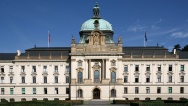Press Advisories
28. 6. 2017 22:57
Prime Minister Bohuslav Sobotka received an honorary doctorate of Josai University in Tokyo
Josai University is the only university in Japan with studies dedicated to the Central European region. It offers its students a study programme which is designed to educate them on the dynamics of Central Europe and to also understand it through learning the languages of Central Europe, including Czech. In addition to his speech on the future of Europe from the point of view of Central Europe and the Czech Republic, Prime Minister Sobotka also met the students who are studying the Czech language at the university.
Speech by the Prime Minister Bohuslav Sobotka at Josai University
Dear ladies and gentlemen, it is a great honour for me to have received an honorary doctorate of Josai University today. I greatly appreciate this acknowledgement and I would like to express my sincere thanks to the university’s board. Despite being quite distant from Central Europe in geographical terms, Josai University is the only university in Japan, which is dedicated to this region, offering its students a study programme aimed at raising their awareness of the dynamics of Central Europe and understanding it also through learning the languages of Central Europe, including Czech. I would like to greet in particular the students of the Czech language.
Today's award and the opportunity to give a speech here fills me with joy – among other things – because I regard this occasion as evidence of the fact that the countries of Central Europe, in its wider conception, have always played a key role and continue to present a motive force for action in the European continent. The Czech Republic is part of this dynamic and it is involved in many areas.
This year, Japan and the Czech Republic are marking the 60th anniversary of the moment when, in 1957, the two countries re-established official diplomatic relations.
However, Japan has played a crucial role in the history of the Czech Republic and particularly of the former Czechoslovakia much earlier, long before the historical foundation of our autonomous country, whose independence had been recognised by the international community towards the end of World War I. Then, at the beginning of 1918, the future first Czechoslovak President, Tomáš Garrigue Masaryk, travelled here to Tokyo to get ready for his journey to the United States to prepare for a crucial discussion with President Wilson, in which he convinced the American President about the plan to establish the independent Czechoslovakia. As a consequence of this radical meeting, the actual foundation of Czechoslovakia took place the very same year.
It appears symbolic to me that my visit to Japan is taking place just as we are approaching the centenary of the event that had such a significant impact on our national history.
While the end of World War I brought national sovereignty and democracy, the Czech lost both with the dawn of World War II. And while the experience of the biggest and most inhumane conflict in the history of mankind has brought former enemies together in an attempt to prevent a similar tragedy from happening again by launching the European integration process, which is carried on to this day in the form of the European Union, Czechoslovakia and other Central and Eastern European countries have remained in the Soviet zone, isolated from this development for four decades.
I am very happy to have had the opportunity to personally experience the political changes at the end of the last century in 1989 – the changes that allowed us to get on the path “back to Europe”, how we had described our effort, which peaked with the accession of the Czech Republic, Poland, Hungary and Slovakia to the European Union in 2004. The European Union presents a key contribution of Europe to world peace and stability and is the guarantor of basic values upon which our society is built. This situation poses requirements on us, Europeans, the citizens of the European Union, and puts us in charge of cultivating European integration and care of its future development.
Ladies and gentlemen, the European Union is currently facing a peculiar situation. After more than 60 years of the integration effort, it has reached a remarkable achievement in the form of long-term peaceful cooperation between 28 different and independent member states. It is cooperation based on common values, mutual solidarity and respect. Undoubtedly, some Europeans already take such benefits for granted; benefits that exist and will exist in the future and that do not require any particular effort. On the contrary, the opposite is true. The European Union is once more at a crossroads, facing probably the biggest challenges in its history. The situation of security around the EU has deteriorated, due to terrorist attacks the security situation inside the EU has also worsened, the situation in the Ukraine and Middle East has declined. There is a global economic uncertainty, a migration crisis and disintegration movements which climaxed last year with the vote of the citizens of Great Britain to leave the EU.
In this context, let me please paraphrase the words of the French Minister of the Armed Forces, Ms Goulard, which she has recently voiced during a defence conference in Prague. She said that we have turned into spoilt children of the peaceful period Europe had experienced, and at the same time, for the first time since World War II we are afraid that the lives of future generations will be worse than ours.
However, I do not see the answer to these fears and preoccupations in abandoning or in loosening the project of European integration. The only answer must consist of a universal endeavour to restore the Europeans' trust in the EU. The European Union must come closer to its citizens in order to make them feel determined again that cooperation in Europe means tangible benefits of a better life, be it the feeling of stability, safety or economic and social certainty.
If Europe succeeds in providing its citizens with these guarantees, it will be possible to dispel the doubts about the utility and meaningfulness of the European project and to stop the growth of populism and extremism. This is the reason why my government and I unambiguously endorse the idea of European integration and cooperation within the European Union.
Dear ladies and gentlemen, let me please address the future of the EU in light of the above-mentioned priorities, that is guaranteeing security and prosperity.
It is not only the threat of terrorism and growing security risks connected to the ongoing conflict in the Middle East and in Eastern Ukraine, but also the change of direction in foreign policy of big international agents, that has greatly affected the attitude towards cooperation in the security and defence policy of the Union. The Czech Republic has made a significant contribution to open the debate on strengthening the Common Defence and Security Policy. We were one of the countries that actively supported this issue at the signing of the Rome Declaration this March.
In this context, a conference on defence and security of the Union was held in Prague at the beginning of June, and this conference significantly contributed in particular to the proposal of creating a common European defence fund, which will be destined to target support of research and innovation in the defence industry.
This idea, however, is not new. The idea of close cooperation in defence policy was already part of the European integration process from the beginning, but due to a variety of reasons, it has never been fully executed. Even a couple of years ago, it would have been totally inconceivable to even mention deeper defence cooperation in Europe. Nowadays, however, we have experienced remarkable progress. A joint declaration between the European Union and NATO was adopted, and a joint European training centre in Brussels was opened.
I firmly believe that it is only better defence cooperation within the EU that can turn Europe into a global agent able to strengthen the North Atlantic Alliance, which remains to guarantee the maintenance of stability and security in Europe. Our turbulent history taught us a lesson that our security must be based on strong and reliable alliances, and this is why the Czech Republic strongly advocates the joint European effort to ensure security inside the Union, outside the Union, and at the same time, remains firmly anchored to NATO.
With regard to ensuring prosperity in Europe, according to the views of the Czech government, the prerequisite of a prosperous Europe consists of strengthening the economic and social convergence between individual member states and their regions. In other words, the convergence of living standards in Europe. The basic tool in this field is the preservation of the functional internal market and its four fundamental freedoms – free movement of goods, persons, services and capital. Young Europeans today can barely imagine the times, which are not that long ago, when it was impossible to travel through Europe without passing through customs and passport control at the border of each country, when it was possible to order fashion clothes or favourite electronic devices online from any member state, or to study there without major obstacles, to gain experience and get to know the culture of a different country.
As I have vivid memories of the times when these opportunities were not accessible to everybody and when travelling outside Czechoslovakia was connected with a never-ending administrative process, I consider these conveniences to be the accomplishment of the European integration project. Such freedom needs to be further cultivated. It is necessary to strive to eliminate persisting barriers and prevent the creation of new ones. What plays an important role in this respect is the ambitious commercial policy and investment-oriented EU budget.
The EU, by far the largest economy and the largest market worldwide, wants to be the advocate of free trade also in global terms. I am very pleased that we agree on this point with Japan.
In times when certain world powers close themselves off, it is essential to take the lead and show that in the long term, protectionism does not lead to prosperity. The negotiations on a trade agreement between the EU and Japan are nearing their conclusion. I therefore expect that together we will fulfil the great expectations set out in this project. The economic growth that we aim for should not be purposeless; the final goal is always to raise the standard of living for the people. My government demands that the differences, which still persist mainly between the western and the eastern part of the EU, but also between the north and the south of the EU, be equilibrated.
The EU is a sufficiently stable economic space to afford a certain level of solidarity of the rich with the poor, since in Europe, as in any other market, there might be winners and losers. My government does its best to ensure that there are as few losers as possible and to reduce the differences between the people and the citizens as much as possible. If the European project is to be successful, it is necessary that everybody reaps benefit from it – only this will enable us to recreate the trust of the people in the European Union.
Ladies and gentlemen, let me please mention briefly the importance of regional cooperation in Europe. Geopolitics and the importance of regions have returned to Europe and the importance of regions such as Central Europe is growing. Central Europe is nowadays the source of stability of the whole continent. In my opinion, successful cooperation in Central Europe can significantly reinforce the confidence in the future of the European Union. The basic platform of our regional cooperation is the Visegrad Group, V4 that connects the Czech Republic, Poland, Slovakia and Hungary. It is the common framework for cooperation activities in various fields across the functions of our governments, but it is also a space where we coordinate our positions and advocate mutual priorities on the ground of the EU as well as NATO.
Nonetheless, we do not want to be limited in our cooperation only within the Visegrad Group. Within Central Europe and the Czech Republic’s relations with its neighbours, I find the dialogue we engage in with Germany and which is part of a wide range of activities that are the basis of the very intense Czech - German cooperation since the 1990s, equally important. Similarly, we are trying to cultivate joint activities with Austria. And this is how we put together the mosaic of Central European cooperation and stability. Central European cooperation is the basis of regional identity for us, and it gives us access to contact with countries outside our region, be it European partners or partners outside Europe, such as Japan.
Dear ladies and gentlemen, I am sure that all the challenges, which the European Union is currently facing and which we have discussed here today, have their concrete solutions. The future of the EU lies in the hands of its member states. The member states of the European Union need to carry on the integration work started by the founders of the Union in post-war Europe. It is essential to carry on their beliefs, their confidence in cooperation possibilities and their effort to ensure peaceful development, stability and prosperity to Europe and to ensure dignity to the people. The Czech Republic wants to participate in this effort, because, in my opinion, a successful and prosperous future for the Czech Republic in the globalised world cannot be separated from the European Union. Thank you very much for your attention.
Bohuslav Sobotka, Prime Minister of the Czech Republic






